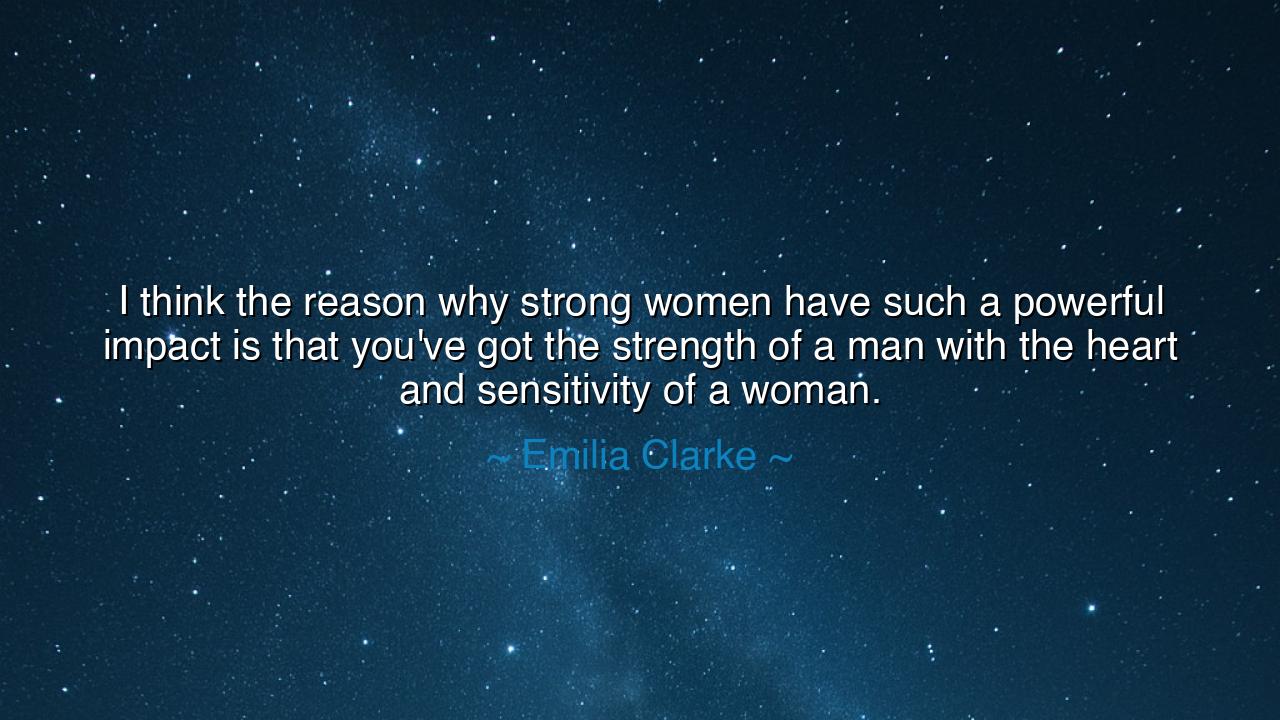
I think the reason why strong women have such a powerful impact
I think the reason why strong women have such a powerful impact is that you've got the strength of a man with the heart and sensitivity of a woman.






The words of Emilia Clarke — “The reason why strong women have such a powerful impact is that you’ve got the strength of a man with the heart and sensitivity of a woman.” — ring like a hymn to balance and wholeness. She speaks of the strong woman not as a denial of femininity, but as its perfect flowering: a union of strength and sensitivity, of courage and compassion, of power and tenderness. In this union lies her unmatched influence, for she embodies the qualities of both warrior and healer, leader and nurturer.
For ages, the world has divided these gifts — strength was praised as the domain of men, while sensitivity was laid upon the shoulders of women. But Clarke’s words reveal that true greatness arises when these forces dwell together in one being. A woman who carries the resilience to endure storms yet keeps her heart open to love and mercy becomes a force that cannot be ignored. Her power is not only in what she achieves, but in how she transforms those around her.
History bears witness. Consider Harriet Tubman, who with unshakable strength led enslaved men and women to freedom, facing danger at every turn. Yet she also carried within her the sensitivity of deep compassion, guiding others not with cruelty but with care, praying with them, encouraging them, and protecting the weak. Her impact endures because she embodied this rare harmony — the iron will to fight oppression and the tender heart to uplift her people.
The origin of Clarke’s insight lies in the ancient truth that humanity was never meant to live divided by false measures of strength and sensitivity. When combined, these gifts give rise to leaders who can both defend and nurture, both build and heal. A strong woman wields her power not to crush but to raise up, not to dominate but to inspire. And in this balance, she shows the world a new way of being human.
Therefore, O children of tomorrow, let this lesson be carved into memory: do not fear the strength of women, nor dismiss their sensitivity as weakness. For in their union lies the secret of enduring influence. As Emilia Clarke reminds us, the impact of strong women is not merely personal, but generational — a legacy of resilience guided by compassion, a power that reshapes the world through both might and mercy.






DKpham tran dang khoi
Emilia Clarke’s statement about strong women balancing masculinity and femininity makes me think about how strength is often defined by external expectations. But what about the strength found in independence, vulnerability, or emotional intelligence? Can we start to define strength more holistically, beyond just physical or societal expectations, and embrace the unique ways women show their power? Shouldn't we be careful about how we frame strength so that it doesn’t limit self-expression?
TTThai ThI Thanh Tra
I love the sentiment behind Emilia Clarke’s quote, but I do wonder—does it set up a binary where strength is only valued if it’s a mix of both masculine and feminine qualities? What if strength is just being unapologetically yourself, regardless of gender expectations? Shouldn't we challenge the idea that certain qualities are inherently masculine or feminine and just focus on what makes a person strong in their own right?
MSMe Soc
Emilia Clarke’s view that strong women combine the strength of men with the sensitivity of women is an interesting way to describe power, but I think it risks reinforcing a stereotype. Why must strength always be seen as a combination of traditionally masculine and feminine qualities? Why can't women simply be strong on their own terms, without comparing their strength to men’s? How can we shift the conversation to celebrate diverse forms of strength?
QQuocvietzzz
Emilia Clarke’s quote makes an interesting point about strength and sensitivity, but I wonder—does this imply that women must adopt masculine traits to be seen as truly strong? Isn’t there strength in vulnerability, too? Could it be that society tends to define strength through traditionally masculine qualities? How do we change the narrative to embrace different kinds of strength, whether in women or men, without needing to balance those traits in a specific way?
VTNguyen van teo
Emilia Clarke's statement about strong women having the strength of a man and the heart of a woman is empowering, but it also raises a question—does this framing suggest that only women with masculine traits are powerful? Is strength in women inherently tied to the balance of both masculine and feminine qualities, or should we be redefining strength to not be dependent on any gendered traits? How do we empower women to embrace their own form of strength?